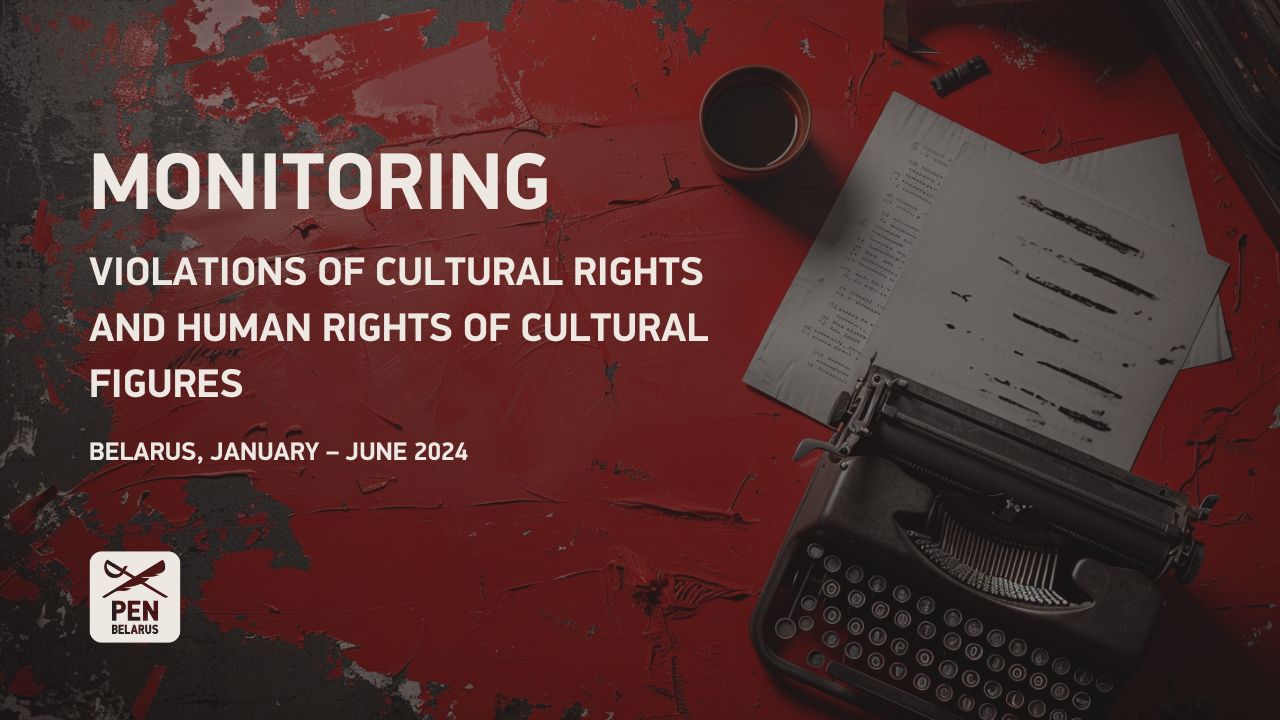
The report is based on the information collected by the PEN Belarus monitors from open sources, through personal contacts and in direct communication with cultural figures in January – June 2024. If you wish to report violations (confidentially) or correct inaccuracies, please contact us at [email protected], t.me/viadoma. The more accurately we can record and analyse the human rights situation in the cultural sphere, the more effectively we can plan our work to support cultural actors and projects. For more information about monitoring, see here.
NB: for users’ information security, we do not provide direct links to sources of information if they are subject to restrictions under the regulations in force in the Republic of Belarus.
Main results
Arbitrary detentions, criminal and administrative prosecution, trials of cultural figures
• Arbitrary detentions and arrests
• Criminal prosecution
• Criminal trials: in-person and in absentia
• Administrative prosecution
Institutionalised pressure in the cultural sector
• Dismissals
• Censorship
• Ban on activities
• Interference in the operation of public associations
State policy in the sphere of culture
Conclusion
Download the pdf version of the report
MAIN RESULTS
The first half of 2024 saw the continuation of arbitrary detentions, criminal and administrative prosecution of cultural figures in Belarus. The reasons for repression were the following:
- participation in the 2020 protests;
- co-operation with exiled Belarusian media, sending information to opposition media;
- critical comments in social networks against the authorities and officials, in response to high-profile events inside or outside Belarus;
- assisting political prisoners and donations to solidarity funds;
- avatars with white-red-white symbols on social media;
- subscriptions to and reposts from independent media channels on the Internet;
- protest art;
- denunciations by “concerned” citizens;
- other grounds.
To this day continue recording and publishing “penitential videos” with cultural figures, deprivation of their right to defence, interrogations and phone checks when crossing the Belarusian border (officers are particularly interested in the ties that cultural figures may have with the diaspora), intimidation, arrests and confiscation of property, politically motivated dismissals, ban on professions, restriction of access to audiences. Persecuted are the cultural figures already behind bars or in home confinement, political emigrants and their relatives in Belarus. The practice when actors and historians, cultural managers and film directors, artists and musicians are labelled as members of “extremist formations” continues. New books, songs, videos and social media pages of cultural figures are designated as “extremist materials”.
Political prisoners – political activist and philanthropist Viktar Babaryka, musician, cultural manager and public figure Maryia Kalesnikava, lawyer, writer and bard Maksim Znak, political activist and cultural manager Siarhiej Cichanoūski – have remained incommunicado: without access to family members and lawyers for more than 18 months.
The highlights from Q2/2024 include the detention of MCs and organisers of cultural and entertainment events, dismissals at the Belarusfilm studio, removal of works from the exposition of the already opened exhibition Art-Minsk 2024, persecution of cultural figures in exile for celebrating the Freedom Day [1] and participating in the elections to the Coordination Council [2]; threatening to extradite film director Andrej Hniot from Serbia to Belarus at the request of the Belarusian side; recognising as “extremist materials” the YouTube channel Chadanovič (“about the literature that has become topical in our time, about the literature in which we live with you now”) as well as three books by the political prisoner, publicist and activist Paviel Seviarynic, the popular science publication Unauthorised Memory. Western Belarus in Documents and Facts. 1921–1954, Songs of a Merry Belarusian by the musician AP$ENT, 27 online accounts of Belarusian language lessons “Mova nanova” in social networks; forced liquidation of the Belarusian Centre of the International Union of Puppet Theatre Workers and the Literary and Art Fund “Nioman”, founded in the mid-1990s.
The monitors also recorded new facts about the destruction of memorial sites and objects of historical and cultural heritage and discrimination of the Belarusian language. The persecution for using national symbols – the white-red-white flag and the coat of arms “Pahonia” – continues.
Persecution between January and June 2024 in figures:
- There were 695 violations of cultural rights and human rights of cultural figures.
- Deprivation of the right to a fair trial is the primary type of violation against cultural people (128 cases), administrative obstruction of activities (including forced liquidation) – against cultural organisations (45 cases).
- Top 10 violations:
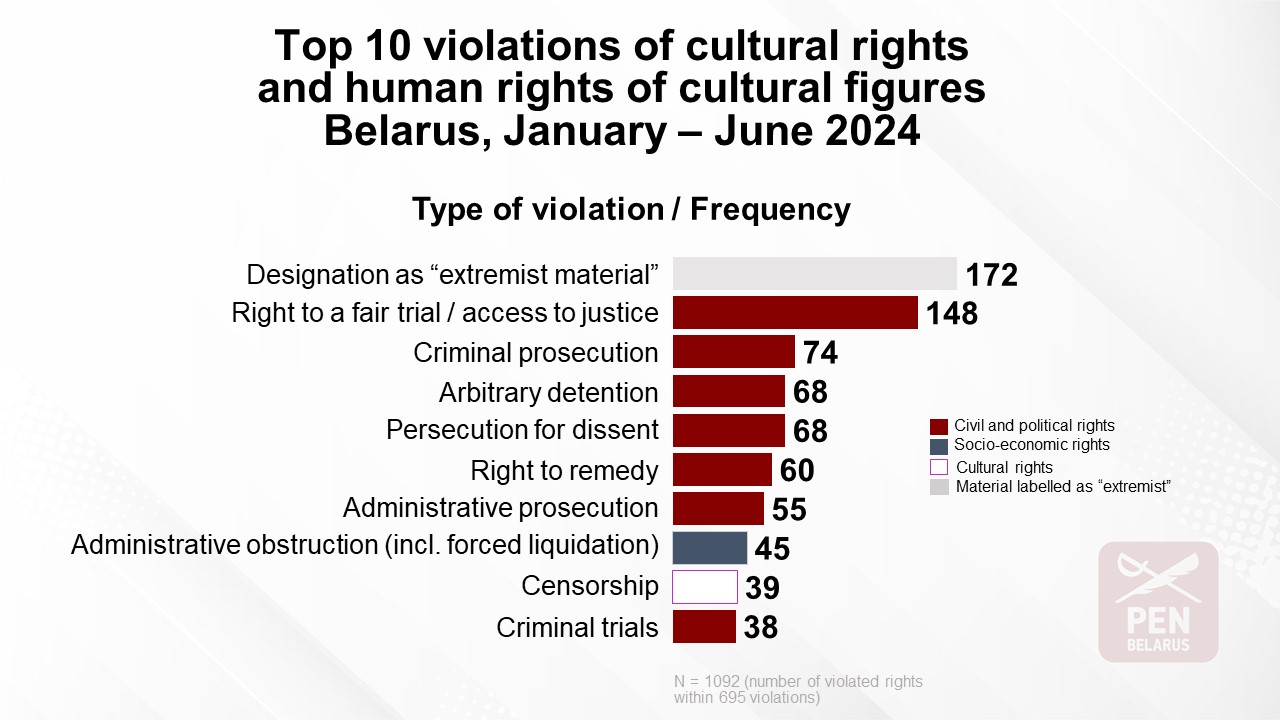
- At least 164 cultural workers are serving sentences in colonies, prisons, remand centres, open-type institutions or in home confinement.
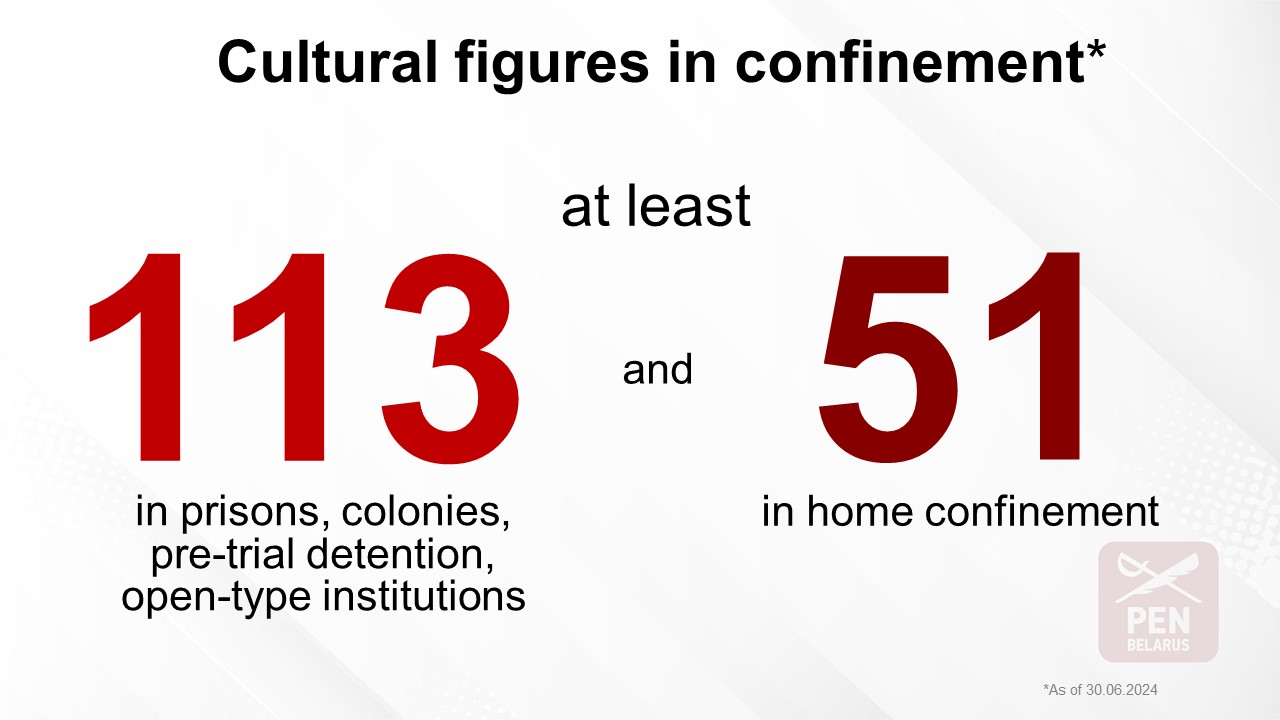
- At least 38 cultural figures were subjected to criminal prosecution. 34 of them appeared in courts, and four were tried in absentia. Out of 34 cultural figures who stood trials, 14 people received between 1.5 and 10 years in a penal colony; one was sentenced to two years of restricted freedom in an open-type facility; 17 people received 2.5-3 years of home confinement, one person was sentenced to forced treatment in a medical facility, the verdict for one more person remains unknown to human rights defenders. For those four cultural figures tried in absentia, the courts handed down sentences ranging from three months of arrest to 12 years in a medium-security penal colony and massive fines.
- Criminal cases were opened against at least 74 cultural figures. In 16 cases, authorities started the so-called ‘special proceedings’ to trial political emigrants in absentia.
- At least 68 cultural workers were arbitrarily detained.
- It is known about the administrative prosecution of 47 cultural figures (55 reports on administrative offences).
- There were 29 cases of politically motivated dismissals.
- 19 non-profits from the cultural sector were forcibly liquidated (source: Lawtrend monitoring).
- The Ministry of Information has included no less than 172 culture-related materials or the social media pages of cultural figures in the List of Extremist Materials
- There were at least 39 cases of censorship of exhibitions, concerts, plays, film screenings and public performances.
The state policy continues to be characterised by the institutionalisation of repression and strengthened controls over all sectors of culture, attacks against dissent and ideological brainwashing of employees and population, anti-Western rhetoric and political use of history in Belarus (in particular, manipulations around the “genocide of the Belarusian people” during WWII), war with national heroes and symbols, and a strong pro-Russian vector of cultural development.
ARBITRARY DETENTIONS, CRIMINAL AND ADMINISTRATIVE PROSECUTION, TRIALS OF CULTURAL FIGURES
ARBITRARY DETENTIONS AND ARRESTS
At least 68 cultural workers were arbitrarily detained (or arrested) in the first half of the year.
The consequences of almost every third detention (22 people) are unknown to human rights defenders. And this is one of the current trends – we continue to experience significant difficulties obtaining complete information about violations.
Security forces continue the practice of recording and publishing “penitential videos”, in which detained cultural figures are forced under duress to “confess” on camera to participating in the 2020 protests, going out on the roadway and being photographed with the white-red-white flag, to making negative comments on social networks about representatives of the authorities; registering in the chat-bot of the Pieramoha (Victory) plan [3], sending information about police officers and other public servants to the Telegram-channel “Black Book of Belarus” [4], sending a ballot with a vote for Sviatlana Cichanoūskaja to the Golos (Vote) chat-bot [5], having a bad attitude towards the Russian military and supporting Ukraine, subscribing to channels labelled by the regime as “extremist”. In some cases, they are also forced to talk about their sexual orientation or the size of their monthly income (when it is significantly higher than average), to admit their “mistakes” and apologise.
In the first half of 2024, there were half as many arbitrary detentions of cultural figures as in the same periods of 2021–2023. Nevertheless, there is no reason to talk about the softening of repression. The number of political prisoners is not dropping, criminal trials are on the rise, and there are more and more cases when information about detention becomes known with delays.
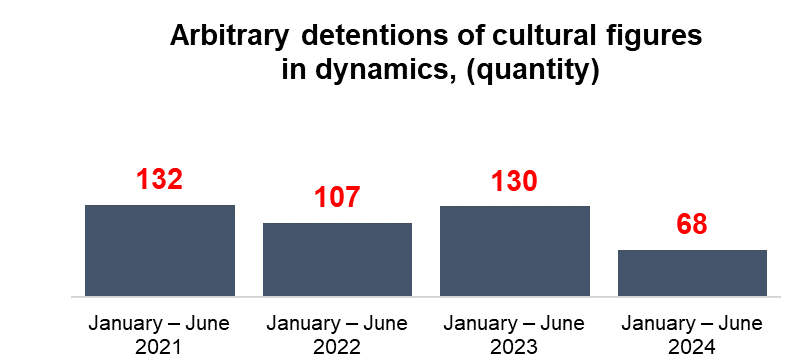
CRIMINAL PROSECUTION
In the first half of 2024, the monitors recorded that criminal proceedings were initiated against 74 cultural figures. More than half of the cases target political emigrants (40 people) – we will provide more details below after first describing the situation inside Belarus.
In Belarus, cultural figures who saw criminal cases opened against them in January – June 2024 are prosecuted for the following:
- participation in the 2020 protests – every second criminal case opened in this period is exclusively under Article 342 of the Criminal Code (Organising and preparing or actively participating in actions that grossly violate public order);
- alleged extremist activity – every fifth criminal case refers to Articles 361-1, 361-2, 361-3, 361-4 (creation of an extremist formation, financing, facilitation of extremist activity) as “elements of the crime”;
- insulting representatives of the authorities – every tenth case includes Articles 367, 368, and 369 (slander, insulting the president/representative of the authorities).
The persecution of dissenters also continues in places of confinement, where prisoners see the duration of their sentences increased through new criminal proceedings under Article 411 of the Criminal Code (Malicious disobedience to the demands of the administration of the correctional institution). During the analysed period, such cases were opened against at least four political prisoners – cultural figures: Eduard Babaryka, Ivan Viarbicki, Dzmitry Daškievič and Aliaksandr Franckievič.
Prosecution of political emigrants. Most criminal cases against cultural figures who have left the country deal with facilitating “extremism” – participation in the creation of “extremist formations” and attempted seizure of power (Article 357). Somewhat less frequently, people are charged with insulting representatives of the authorities. People of culture are among those prosecuted in the so-called ‘Sviatlana Cichanoūskaja’s Analysts’ case, in which they were accused of preparing theses for publications and public speeches for Cichanoūskaja and others. Cultural figures are also charged in the ‘Belarusians Abroad’ case for celebrating [6] Freedom Day in different cities with active Belarusian diaspora and participating in the elections to the Coordination Council and on other occasions. During this period, courts started special proceedings against 16 cultural workers, ordered the seizure of their property (flats, houses and land plots) and issued the first four sentences.
The situation with the persecution by the regime of the Belarusian film director and activist Andrej Hniot deserves a mention. Hniot is facing extradition from Serbia to Belarus, where prosecutors opened a politically motivated criminal case against him. Hniot was detained in Serbia in October 2023 at the request of the Belarusian authorities, who had placed him on Interpol’s wanted list. The director spent more than seven months in a Serbian prison before a transfer to house arrest in June 2024. In December 2023, a Serbian first-instance court approved Hniot’s deportation. The case is under review after an appeal in March 2024.
CRIMINAL TRIALS: IN-PERSON AND IN ABSENTIA
In the first half of the year, it became known about criminal sentences against 38 cultural figures. Four of them were tried in absentia.
In-person trials and sentences
The following cultural figures received lengthy prison terms during the first six months of 2024:
- Belarusian language and literature teacher Ruslan Pracharenka – 10 years in a penal colony for state treason (Article 356 of the Criminal Code), incitement of hatred (Article 130 of the Criminal Code), facilitating extremist activities (Article 361-4 of the Criminal Code), failure to report about the crime (Part 1 of Article 406 of the Criminal Code). The trial was held behind closed doors, and the case details remain unknown. The independent media outlet Radio Svaboda reported, quoting their sources, that the case concerned the photographing objects on Belarus’s territory.
- DJ Artem Makovei, a citizen of Ukraine – 6 years in a penal colony for alleged espionage activities (Article 358-1 of the Criminal Code). Artem’s trial was held behind closed doors; the case details are unknown.
- Writer, translator from Chinese to Belarusian, one of the best graduates from the Philology Faculty at Belarus State University in 2022 Darja Chmialnickaja –5 years in a penal colony for participating in protests (Article 342 of the Criminal Code) and donations (Article 361-3 of the Criminal Code);
- Ksenija Chodyrava, an honourable graduate of the BSU Department of Cultural Studies (“Best BSU Graduate 2018”) – 5 years in prison for donations (Art. 361-2, 361-3 of the Criminal Code).
The situation with the so-called ‘special confiscation’ deserves a mention. Thus, the linguist Anastasija Maciaš, convicted for cooperation with the Belsat TV channel [7] (designated as an “extremist formation” by the Interior Ministry in November 2021), not only received two years in a penal colony and a fine of 20,000 BYN (~ 8 thousand euros). The court also ordered to recover from her 102,415 BYN 12 kopecks (~30 thousand euros) as allegedly criminally obtained income.
Uladzimir Fišman was sentenced (the number of years in prison is unknown, charged under Art. 361-1 of the Criminal Code (CC)); writer, poet and activist Aleh Kacapaū (2.5 years in prison, Art. 130 and 368 CC); photographer Aliaksandr Vasiukovič (3 years of home confinement, Art. 342 CC); photographer and documentary filmmaker Aliaksandr Ziankoū (3 years in prison, Art. 361-1 CC); musician Dzmitry Šalak (the sentence is unknown, Art. 368 and 369 CC); artist Hanna Kruk (3 years of home confinement, Art. 342 CC); musician Jaūhien Šum (3 years of home confinement, Art. 342 CC); artist Uladzimir Lykšyn (2.5 years of home confinement, Art. 342 CC); musicians Aliaksandr Iljin, Dzmitry Choliaūkin and Siarhiej Kulša (2.5 years of home confinement each, Art. 342 CC); journalist and author of texts about the cultural and historical heritage of Belarus Ihar Karniei (3 years in prison and a 20,000 BYN fine, Art. 361-1 CC); writer and cultural manager Siarhiej Makarevič (2 years of restricted freedom in an open-type institution, Art. 361-2 CC); poet, organiser of cultural events and journalist Aksana Jučkovič (3 years of home confinement, Art. 342 CC); photographer Aliaksandra Melnyček (the number of years in a colony is unknown, Art. 342 and 130 CC); artist and cartoonist Ivan Viarbicki (2 more years in a colony, Art. 411 CC); musician Aleh Liadenka (2.5 years of home confinement, Art. 342 CC); ceramist Alena Karpienka (1.5 years in a penal colony, Art. 367 CC); craftswoman and artist Nelly Alfiorava (compulsory treatment in a psychiatric hospital, Art. 369 CC); writer, poet, translator and doctor Alena Cieraškova (3 years of home confinement, Art. 342 CC); musician Ruslan Praūda (home confinement, Art. 342 CC); writer and anarchist Aliaksandr Franckievič (1 more year in a colony, Art. 411 CC). On 28 June, architects Darja Mandzik, Ilja Palonski and Raman Zabela, detained in February this year in a wave of detentions and searches of the community of architects, were sentenced to home confinement (Article 342 of the Criminal Code).
It is also known about the trials of two more actors (2.5 years of home confinement each, Art. 342 CC) and an illustrator (3 years of home confinement, Art. 342 CC).
More than every second charge (59 % of cases) included Art. 342 (Organising and preparing or actively participating in actions that grossly violate public order). In the cases where participation in protests was the only charge, home confinement was a common punishment (for 2.5–3 years), except for the ruling against the presenter and cultural manager Jahor Zienčanka, who received two years in a penal colony. Those prosecuted under the articles interpreted by the regime as participation in extremist activities (361-1, 361-2, 361-3, 361-4), defamation of representatives of the authorities (367, 368, 369), incitement to hatred (130) and others, most often end up in a colony.
Thus, out of 34 cultural figures, 14 were sentenced to 1.5–10 years in a colony, one – to 2 years of restricted freedom in an open-type facility, 17 – to 2.5–3 years of home confinement, and one – to compulsory medical treatment. The results of the trials of one more cultural figures remains unknown to human rights activists.
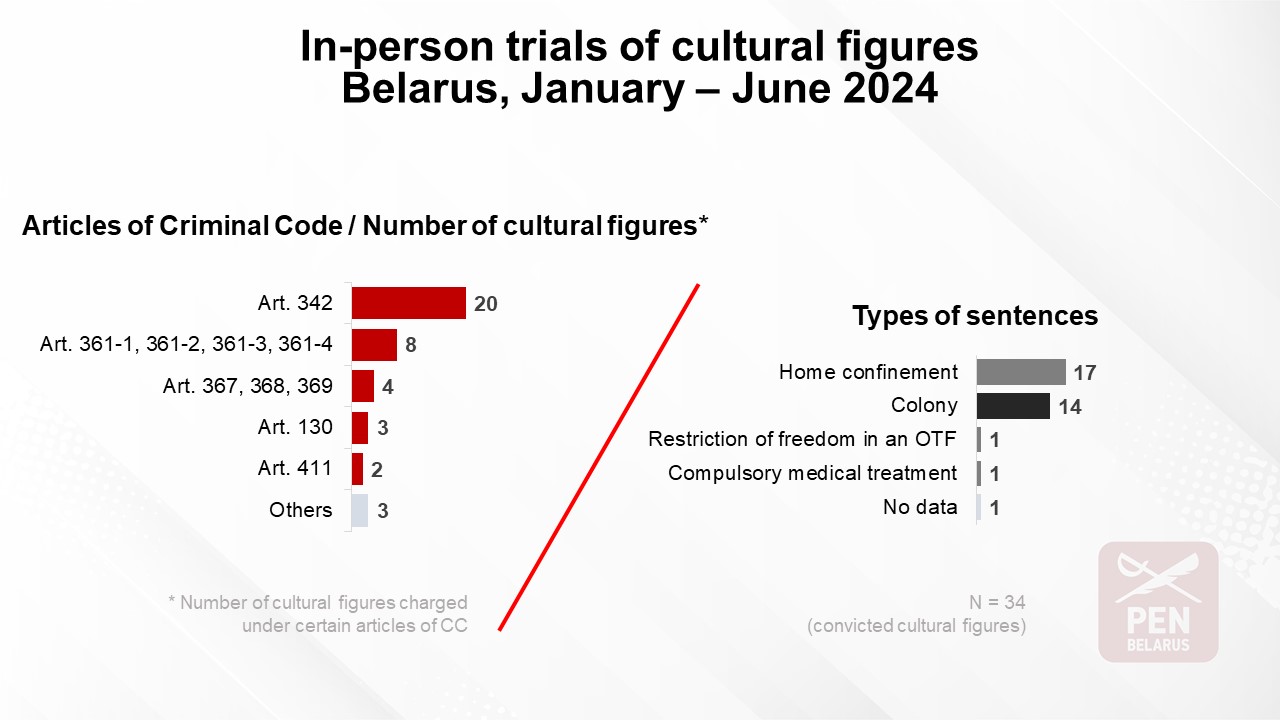
Among the trends in the field of politically motivated proceedings in Belarus are repeated and subsequent convictions on political grounds, closed trials, and lack of information about the time or place of the trial. Thus, the Human Rights Centre “Viasna” reported that there was no information about the start time of the hearing on 11 January in the case of artisan Dzmitry Šaūčenka. There was also no information about the place of the hearing on 6 February in the case against musician Dzmitry Šalak.
Trials and sentences in absentia
On 24 June, the Brest Region Court convicted in absentia six political emigrants, including four cultural figures, in a closed trial. Songwriter and blogger Andrej Pavuk was sentenced to 12 years in a penal colony and fined 200,000 BYN (~ 59,200 euros) for his role in the satirical YouTube channel Rudabelskaja Pakazucha and several other charges. In May 2023, the Interior Ministry designated the channel as an “extremist formation”. In the 2010s, it published “inconvenient” news from the life of the Kastryčnicki settlement in the Homiel region, after 2021, the channel’s host made live phone calls to the direct lines of Belarusian officials. Pavuk is one of the channel’s founders. Opera singer Marharyta Liaūčuk and rock musician Uladzislaū Navażylaū, also charged with participating in the “extremist formation” Rudabelskaja Pakazucha, among other “crimes”, received between six and eight years in a penal colony and the 20,000 BYN and 32,000 BYN fines.
Producer and blogger Aliaksandr Čachoūski was tried in absentia for insulting a representative of the authorities and desecrating the state symbols and punished with three months of arrest. Čachoūski noted in his public video address that he did not even know what he was accused of. He claimed that the Brest Regional Court violated Article 14, paragraph 3d of the International Covenant on Civil and Political Rights, as he was utterly deprived of the opportunity to defend himself. He was not duly informed about the start of special proceedings against him, was not provided with any information about his lawyer, and the latter did not contact him in any way.
ADMINISTRATIVE PROSECUTION
During the year’s first half, the monitors recorded 55 cases of administrative proceedings against 47 cultural figures (with and without detention). The monitors have information about the articles in the Code of Administrative Offences used in the rulings against 40 cultural figures. In the first half of 2024, dissemination of allegedly extremist materials (Article 19.11 of the Code of Administrative Offences “Distribution, production, storage, transportation of information products containing calls for extremist activity or promoting such activity”) accounted for 80 % of cases when administrative offence reports were drawn up.
Courts ruled to subject cultural figures to administrative arrest (between 5 and 15 days) or fines (between 600 and 5400 BYN) for subscribing to “Hrodna News” on the VKontakte social networking platform, using the logo of an “extremist” channel in their profiles in “Odnoklassniki”, subscribing to Zerkalo.io, Radio Svaboda and “Honest People” on Instagram, taking a photo with the Belsat TV logo in their Facebook profiles, etc. For example, for the distributor of Belarusian books, Barys Chamajda, who was fined 600 BYN, such an amount is comparable to the size of his monthly pension. In some cases, courts also ordered confiscation of a mobile phone in addition to the days of arrest or a fine.
Although two years have passed since Article 19.11 of the Administrative Code of the Republic of Belarus replaced the “popular” Article 23.34 [8] (Violating the procedure for organising or holding mass events), widely used by the judicial system in 2020–2021 against the participants in peaceful street protests, the latter remains relevant today. Almost every fifth administrative offence report deals with “unauthorised picketing” based on old photos or pictures containing national symbols – the white-red-white flag and the Pahonia (Pursuit) coat of arms. An excerpt from the offence report drawn up on a Belarusian writer in 2024 for a publication made in 2021 reflects, among other things, the attitude of the current authorities to the historical heritage. It reads: “… placed and kept a Telegram sticker in the form of a piece of white-red-white cloth, which can be viewed by other users of the messenger mentioned above. In this way, he publicly expressed his personal and other interests in social and political life events, thus carrying out unauthorised picketing without a permit from the local authorities“.
The charts below show how the proportion of ‘offences’ recorded against cultural figures in administrative rulings has changed from 2020 to June 2024.
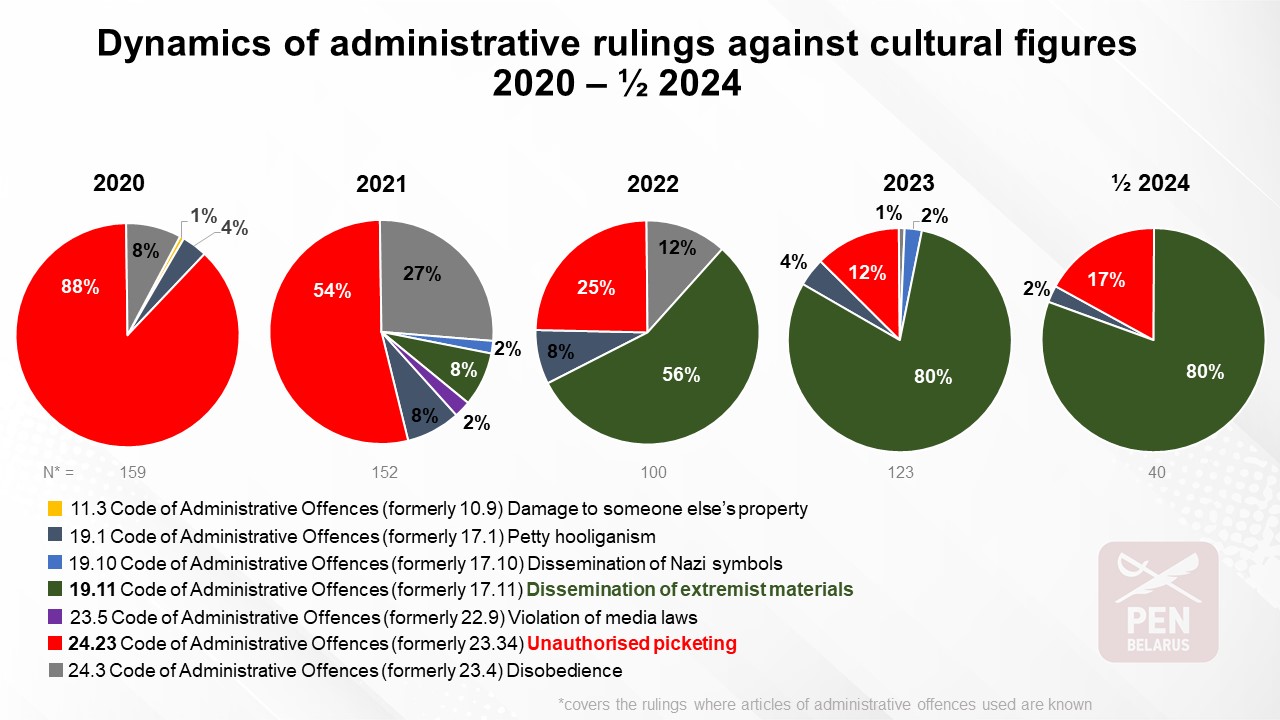
INSTITUTIONALISED PRESSURE IN THE CULTURAL SECTOR
DISMISSALS
In the first half of 2024, the violation of the right to work was recorded in relation to 32 cultural sphere workers, including 29 cases of politically motivated dismissals and 3 job refusals when no professional qualifications were required. Minister of Culture Anatol Markievič said in late March: “The authorities are cleansing the ranks of the creative intelligentsia of those who undermined the foundations of the state, which had nurtured and fed them.” This is how the Belarusian regime has worked for the past four years to identify and eliminate cultural figures disloyal to Lukašenka’s rule. Their employment is terminated through an allegedly mutual agreement between the parties and the non-renewal of job contracts. The contracts are not renewed after cultural-sector employees appear on the “unreliable” workers list or after the denunciation by colleagues or “concerned” citizens. Non-renewal also happens after an inspection by a security specialist or as a consequence of politically motivated administrative prosecution. The police or prosecutor’s office notifies the employer about the employee’s “offence” and “incompatibility with job position”.
The monitoring report on the first quarter of 2024 mentioned dismissals from the Museum of Traditional Culture in Braslaū, Minsk Regional Puppet Theatre “Batlejka” in Maladziečna, Belarusian State Academic Musical Theatre. In the second quarter, it became known about new dismissals in the cultural sector – termination of labour relations with professionals, prominent specialists, and winners of numerous (often state-sponsored) awards and prizes. For example, the artistic director Viktar Klimčuk was fired from the Lialka puppet theatre in Viciebsk after serving there since 1990. The state-owned film production company Belarusfilm “parted ways” with animator Aliaksandr Lenkin, who had worked at the animation studio for 40 years, and the leading specialist Valiancina Nikifarava. Film director Aksana Ejchart, documentary filmmaker Halina Adamovič, who had worked at the company since 1995, and filmmaker and writer Uladzimir Maroz, who came to Belarusian cinema in the early 1980s, were dismissed from the documentary film studio “Letapis”. Information about CEO Dzmitry Harelik, who was brought to administrative responsibility for “disseminating extremist information” in January this year, disappeared from the list of contacts on Homiel Puppet Theatre’s website. The monitors learned from non-public sources about dismissals in the A.K. Hlebaū College in Minsk, H. Šyrma Music College in Brest, the National Academy of Arts, the University of Culture and Arts, and other cultural education institutions.
For the most part, repressed specialists not only receive a ban on their profession but are deprived of the possibility to earn a living in principle. They cannot get jobs as janitors, loaders, or kindergarten workers. Officials in charge of ideology and personnel loyalty embedded in the system of state institutions do not clear them even for such positions.
The practice of vouching has become a familiar pattern in today’s Belarus. Our interlocutors – cultural workers in the public sector – mentioned two lists of disloyal persons. People from the second list are entitled to work in public institutions on condition of guarantees; those from the first list are not. The practice implies that the director of an institution vouches for “unreliable” employees, and the former assumes responsibility for their behaviour. Currently, every cultural institution has a list of vouched workers. Thus, one can talk about different levels of “unreliable” personnel from the state’s point of view.
Dismissals and intimidation, social media scrutiny and coercion to join trade unions, excessive bureaucratisation of processes and ideological brainwashing of employees, and total censorship and control are the integral ingredients of the working conditions in state institutions. As one of the former employees of a regional cultural institution, who quit after the Russian Federation unleashed war in Ukraine, told us in a private conversation, some people turn a blind eye to what is happening and continue working; some say they are “out of politics”, some people can’t stand it and quit on their initiative. It is not uncommon to see a shortage of workers in the sector: someone was sacked or jailed, some quit, and someone left the country. The rejuvenation of personnel and the problem with the transfer of experience and traditions is one of the consequences and current negative trends in the system of state culture.
CENSORSHIP
Censorship and the grip of ideology clamp creativity in the state and independent culture sectors. All artists undergo KGB checks before performing on stage (“If you are clean, you will be allowed on stage”). The “ban lists” of musicians and songs include hundreds of performers barred from concert venues, corporate parties and radio airtime. It is forbidden to perform Ukrainian and Polish songs in public places; otherwise, authorities can interpret it as extremism. Obtaining a touring licence is a quest that few people manage to complete.
The high-profile facts of censorship that took place in the first quarter of 2024 were mentioned in the previous report. The affected events included the following exhibitions: Insomnia by Uladzimir Kandrusievič in the Theatre of Belarusian Drama, Vasil Bykau. Living through abrasions and lines… in the State Museum of the History of Belarusian Literature, 1.10 squares in the Minsk Palace of Arts, the Clara Was Here play in the Belarusian State Youth Theatre, a screening of films by Alexander Sokurov and Alexander Zolotukhin in the Falcon Club Cinema Boutique.
In line with the pattern of recent years in Belarus, censors ordered the removal of several paintings after the opening of the Art-Minsk 2024 exhibition on 3 May. Affected were the works of artists who condemned violence against peaceful protesters in 2020. In general, Art-Minsk is a litmus test of what is happening in the sphere of fine arts. The number of participants has dropped significantly, primarily due to the ever-growing “ban list”: 200 authors in 2024 against “more than 400 Belarusian and foreign artists” at the Art-Minsk 2020 festival.
The Ministry of Culture cancelled the concerts of Russian performers Mzlff (Ilya Mazelov) and Alena Shvets, scheduled to take place at the Re:Public club in April and May, respectively, following a “collective appeal” by pro-government activist Volha Bondarava, who saw a “huge destructive component” in the works of the performers.
We will refrain from citing non-public or unpublicised censorship facts and denying artists and cultural figures access to their audiences.
BAN ON ACTIVITIES
In late May – early June, a series of detentions of MCs and directors of event agencies took place following the denunciations by pro-government activist Volha Bondarava, who called them “white-red-white devils” and accused them of attempting a coup d’état. She demanded that the Ministry of Culture cleanse the register of organisers of cultural and entertainment events. On 27 May, it became known about the detention of the founder of the event agency Grafimil Siarhiej Sarokin and his wife, a dance instructor. Also detained were AP Event CEO Andrej Paplaūski on 28 May; Event Café CEO Jury Kapucki and co-founder Ruslan Danilkovic on 30 May; Most Event MCs Viktar Stelmach and Pavel Paškievič on 31 May; Pink Zebra deputy director Aleh Astrolenka on 5 June.
Following the detentions and “penitential videos” with representatives of event agencies, the Ministry of Culture removed the organisations from its register. On 5 June, there were already six fewer event agencies on the register, with the “excluded” mark appearing in the place of Event Cafe, Pink Zebra, Grafimila, Svetomuzyki bai, AP Event, and Most Event. In mid-June, two more companies – Zoykina Kvartira and PhoenixArt – were removed. In the monitoring, we designate this violation as administrative interference in the work of organisations in the form of a ban on their activities. The organisations that had gone through all the prescribed procedures and were included in the register on legal grounds were removed immediately.
INTERFERENCE IN THE OPERATION OF PUBLIC ASSOCIATIONS
During the analysed period, the courts ordered the forced liquidation of 19 non-profit organisations in the field of culture, including eight of them established in Belarus as far back as the 1990s. The measure affected the following spheres:
- theatre (Family Inclusive Theatre Foundation and the Belarusian Centre of the International Union of Puppet Theatre Artists (UNIMA) were liquidated);
- literature and language (Literary and Artistic Fund “Nioman”, which published the Dziejasloū magazine (the last 127th issue came out at the end of December 2023), Belarusian Republican Public Association of German Language Teachers);
- history and culture of memory (Belarusian Association of Victims of Political Repressions, Historical Society “Trascianiec”, Assembly of Heirs of the Nobility, public association “Istorika”);
- ethnic minorities (the Georgian Cultural and Educational Society “Mamuli”, the Public Organisation of Belarusian-Turkmen Friendship “Dostluk”, and the association of Tatars “Zikr ul-Kitab”);
- architecture (Belarusian Academic Centre MAAM, Belarusian Public Association of Architects and Construction Scientists);
- others.
It is worth noting that on 4 March 2024, the deadline expired for bringing the statutes of public associations in compliance with the new requirements of the law “On Social Changes”, adopted in Belarus on 14 February 2023. Since then, the organisations that have failed to comply with the requirements face liquidation. This does not cancel the repressive nature of this legislation.
New facts of interference in the activities of associations of photographers, designers and artists have been recorded. One of the main types of pressure is the manipulation over the exclusion from professional unions.
STATE POLICY IN THE SPHERE OF CULTURE
The state continues the pattern of institutionalised repressions and greater controls over each cultural sector, including the fight against the dissent and ideological brainwashing of employees and population, anti-Western rhetoric and monopolisation of historical truth, manipulation of “genocide of the Belarusian people during WWII”, a war with national heroes and symbols, and a strong pro-Russian vector of cultural development. The state encourages the activities of cultural workers who serve the authorities’ interests.
Repressive legislation
Legislation in the cultural sphere is repressive. It does not meet the standards for realising freedom of creativity and cultural rights. Control and discrimination increase with each new law and regulation.
The monopolisation of historical truth and manipulation of the “genocide of the Belarusian people during WWII”
The Belarusian authorities manipulate public consciousness using the concept of the genocide of the Belarusian people during World War II to justify the repression of the 2020 protesters and suppress alternative views of history. As part of this narrative, criminal investigations into the genocide continue. The legislation was amended to allow for the trial of the dead. The first posthumous sentence was carried out. Genocide denial is subject to criminal prosecution. The “Genocide of the Belarusian People” course was introduced into the school curriculum. It draws parallels between the collaborators of the war times and the 2020 protesters. Patriotic projects, memorials (the Tree of Life sign will be installed in all regions), and military-historical reconstructions used by political propaganda are the tools for manipulating history in Belarus.
Persecution for national symbols and the pledge of allegiance to state symbols
Prosecutions for using national symbols – the white-red-white flag, Pahonia coat of arms, and the slogan Żyvie Belarus! (Viva Belarus!) – continue in 2024. Punishments include arrests, fines and community service for such actions as displaying the flag, shouting the slogan, publishing photos and images on social networks, and blowing white-red balloons, which officials interpret as “unauthorised picketing” (Article 24.23 of the Code of Administrative Offences). At the same time, authorities organised the following events demonstrating loyalty to the state symbols and Lukašenka’s rule to support the regime: the state flag show, swearing the oath of allegiance to the state symbols, handing over the flag that was at a space station to Lukašenka, celebrating the Day of the State Flag, the State Emblem and the State Anthem of the Republic of Belarus, and other rituals of honouring.
Pro-Russian development vector
Russian-Belarusian cultural integration continues, enhanced by numerous joint activities and projects: signing of new agreements and memoranda between cultural and educational institutions of the two countries, joint video bridges of schoolchildren, introduction of Russian-Belarusian textbooks and manuals into the educational process, opening of a new branch of the Russian Centre of Science and Culture (now in Hrodna), Russian literary evenings and art exhibitions, performances by Russian directors, the prevalence of Russian films in the cinema, installation of sculptures with characters of the Russian Empire, days of spiritual culture of Russia in Minsk, Putin awarding a state award to a teacher of the Gomel University named after F. Skaryna, symbolic presentation of the library card from the Russian State Library to the Minister of Culture of Belarus, numerous Russian-Belarusian conferences, festivals, forums and other projects to utilize Russian grants.
Culture serves the power
The regime uses culture to strengthen its legitimacy and propaganda, rewarding those who support and praise the president and his course. For the 30th anniversary of the presidency, myths, portraits and shows are created to serve the cult of the dictator and emphasise Lukašenka’s importance to the country as a supposed guarantor of peace and stability despite repression and mass emigration of regime opponents. New pictorial works, such as the portrait of Maryna Vasileūskaja, the first female cosmonaut in the history of Belarus, demonstrate the close connection between art and state ideology.
CONCLUSION
The signs of the current times are as follows:
- administrative trials for “spreading extremism” and the lists of “extremist materials”;
- the growing “ban lists” of cultural figures;
- “penitential videos” showing the arbitrarily detained people and those who “came to the police and asked to be allowed to apologise for their actions in 2020”;
- denunciations of “unreliability” by pro-government activists and sometimes by colleagues in the cultural sphere;
- lack of information about the charges after detention, the date or place of trial, the sentence, and sometimes the fact of prosecution;
- queues to the KGB for “voluntary” compensation of donations made to solidarity funds in 2020;
- colleagues in home confinement;
- checks of employees’ social media accounts;
- withdrawal from social media after solid recommendations and “until better times”;
- letters to political émigrés inviting them to return home;
- enquiries about ties with the diaspora when crossing the Belarusian border and the standard set of questions about activity in 2020;
- recommendations from human rights defenders to consider safety in the situations of new waves and subjects of persecution;
- a life of fear and reduced mobility;
- total self-censorship;
- cancellations and postponements of cultural events;
- closure of individual units or entire departments of educational institutions;
- shortage of qualified personnel;
- other violations and their consequences.
Recommendations from cultural organisations to address the crisis.
[1] Unofficial Independence Day of Belarus, celebrated on 25 March.
[2] A representative body of Belarusian democratic forces and civil society organisations.
[3] A secret plan to mobilise Belarusians to oppose Lukashenka’s regime, developed by former members of the security services.
[4] A channel that published the identities of people involved in the rigging of the 2020 presidential election, violence and repression of civilians.
[5] An online platform for alternative vote counting.
[6] A report on the results of the Freedom Day celebrations.
[7] Polish media focused on Belarus.
[8] Article 24.23 in the new Code of Administrative Offences was introduced on 1 March 2021.
